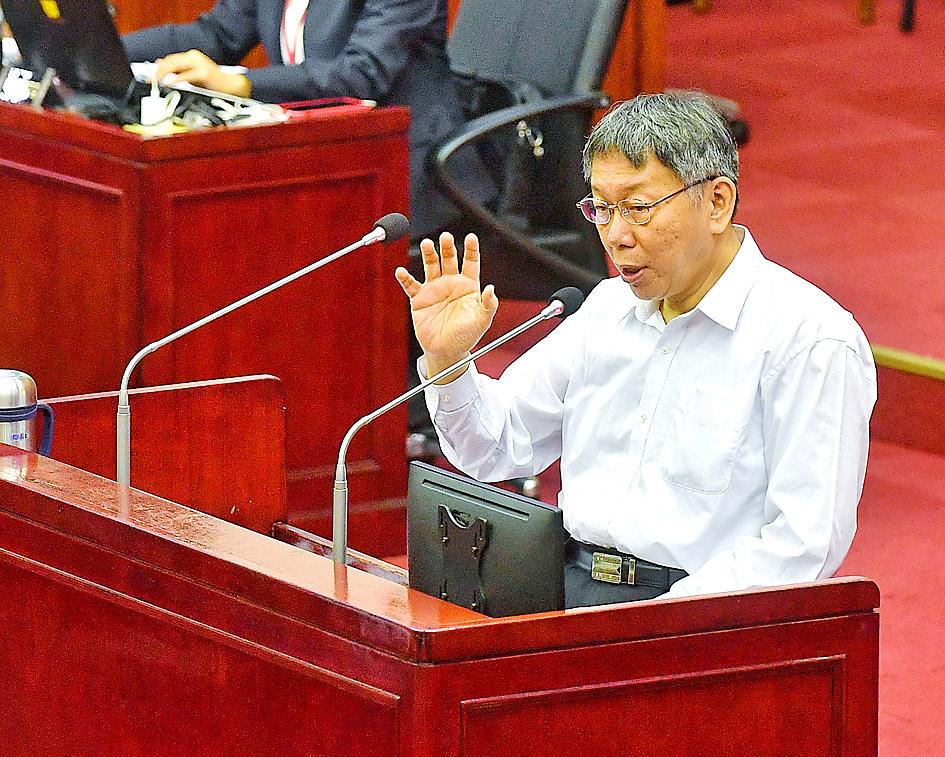The Taipei City Government would cancel its New Year’s Eve Party and all large events if 15 or more confirmed cases of COVID-19 are reported in the city within a week, Taipei Mayor Ko Wen-je (柯文哲) said yesterday.
Addressing the Taipei Cross Border E-Commerce Annual Convention, Ko said the COVID-19 pandemic has brought many uncertainties to society, and that e-commerce is on a path of no return and would continue to grow.
Many countries have not effectively controlled their COVID-19 outbreaks, and although Taiwan implements strict border controls and there have been few inbound passengers, the pandemic is unlikely to end soon, so people have to adapt to “the new normal,” Ko said.

Photo: CNA
“The world is not the same anymore and there is no way of returning to [the way things were] before,” Ko said, adding that people have to practice risk management in this new situation.
If Taiwan does not report any local infections for a long period, the New Year’s Eve Party would be held as usual, he said.
Citing examples of cluster infections in South Korea, Japan and Singapore, Ko said 15 new COVID-19 cases could emerge in a short period if precautionary measures are not fully implemented.
“When people ask me if the New Year’s Eve Party will be held, my answer is: ‘Who knows?’” Ko said, adding that the events could be canceled only three days before their scheduled date, as anything could happen, so risk management is crucial.
Asked about Ko’s remarks in a separate setting, Minister of Health and Welfare Chen Shih-chung (陳時中), head of the Central Epidemic Command Center (CECC), said that as infection risk is low in Taiwan, the center respects local governments’ decisions on whether to hold large events, but urged attendees to wear a mask.
Deputy Minister of the Interior Chen Tsung-yen (陳宗彥), deputy head of the CECC, said that each city and county holds a New Year’s Eve Party in a different setting, but they have agreed to cooperate with the CECC’s disease prevention policies based on the latest COVID-19 situation.

US climber Alex Honnold is to attempt to scale Taipei 101 without a rope and harness in a live Netflix special on Jan. 24, the streaming platform announced on Wednesday. Accounting for the time difference, the two-hour broadcast of Honnold’s climb, called Skyscraper Live, is to air on Jan. 23 in the US, Netflix said in a statement. Honnold, 40, was the first person ever to free solo climb the 900m El Capitan rock formation in Yosemite National Park — a feat that was recorded and later made into the 2018 documentary film Free Solo. Netflix previewed Skyscraper Live in October, after videos

Starting on Jan. 1, YouBike riders must have insurance to use the service, and a six-month trial of NT$5 coupons under certain conditions would be implemented to balance bike shortages, a joint statement from transportation departments across Taipei, New Taipei City and Taoyuan announced yesterday. The rental bike system operator said that coupons would be offered to riders to rent bikes from full stations, for riders who take out an electric-assisted bike from a full station, and for riders who return a bike to an empty station. All riders with YouBike accounts are automatically eligible for the program, and each membership account

NUMBERS IMBALANCE: More than 4 million Taiwanese have visited China this year, while only about half a million Chinese have visited here Beijing has yet to respond to Taiwan’s requests for negotiation over matters related to the recovery of cross-strait tourism, the Tourism Administration said yesterday. Taiwan’s tourism authority issued the statement after Chinese-language daily the China Times reported yesterday that the government’s policy of banning group tours to China does not stop Taiwanese from visiting the country. As of October, more than 4.2 million had traveled to China this year, exceeding last year. Beijing estimated the number of Taiwanese tourists in China could reach 4.5 million this year. By contrast, only 500,000 Chinese tourists are expected in Taiwan, the report said. The report

Temperatures are forecast to drop steadily as a continental cold air mass moves across Taiwan, with some areas also likely to see heavy rainfall, the Central Weather Administration (CWA) said. From today through early tomorrow, a cold air mass would keep temperatures low across central and northern Taiwan, and the eastern half of Taiwan proper, with isolated brief showers forecast along Keelung’s north coast, Taipei and New Taipei City’s mountainous areas and eastern Taiwan, it said. Lows of 11°C to 15°C are forecast in central and northern Taiwan, Yilan County, and the outlying Kinmen and Lienchiang (Matsu) counties, and 14°C to 17°C